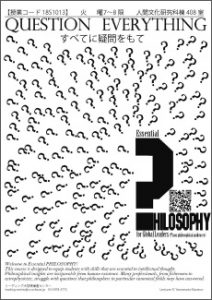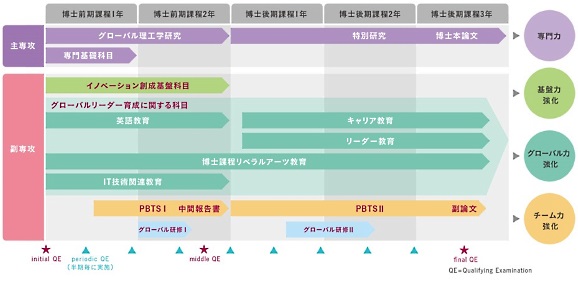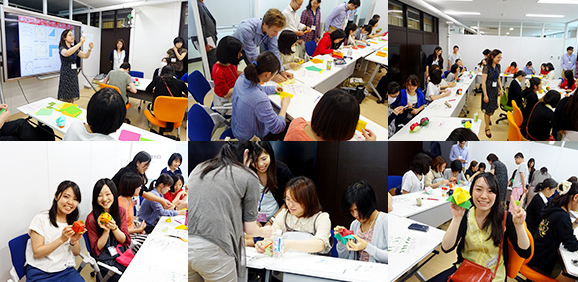次世代のグローバルリーダーを育成するためのコースワークである博士課程リベラルアーツ科目から、Essential Philosophy for Global Leadersを10月1日より開講します。
この授業は、グローバル理工学副専攻の履修科目になっていますが、博士前期・後期課程に所属する学生はどなたでも履修することができますので、グローバル力の強化を目指している方には受講をお勧めします。なお、講義は英語で行われます。
主題と目標
Key themes:
– Historical and contemporary relevance of philosophy
– Integrating philosophy in other fields
– Philosopher’s public role
Objectives:
– To recognize philosophy as scientifically meaningful and socially useful
– To counterbalance the old and new in our understanding of philosophy
– To reflect on the general and technical roles of philosophy
– To integrate philosophy in your discipline
– To educe personal philosophy and leadership
学生へのメッセージ
 Welcome to Essential PHILOSOPHY!
Welcome to Essential PHILOSOPHY!
This course is designed to equip students with skills that are essential to intellectual thought. Non-philosophic audiences, from fishermen to astrophysicists, struggle with cruxes that philosophers in a particular canonical field work on. Philosophic insights are inseparable from human existence and its applications are numerous, whether in design, programming, communications, toxicology, policy etc.
Classes will consist of short and clear lectures combined with discussions and lively debates.
This course will be conducted in the simplest possible English.
講義概要
| 科目名 |
|---|
| Essential Philosophy for Global Leaders [19S1013] |
| 単位数 |
| 2.0単位 |
| 担当教員 |
| 山本 ラヴェナー ロクサナ (お茶の水女子大学リーディング大学院推進センター特任講師) |
| 対象 |
| 博士前期・後期課程 学部生も聴講できます。理系・文系は問いません。 |
| 場所 |
| 人間文化研究科棟408室 |
| 日時 |
| 火曜7~8限(15:00-16:30) 2019年 10月1日、8日、15日、29日 11月5日、12日、19日、26日 12月3日、10日、17日、24日 2020年 1月7日、14日、21日 |
| 授業計画 |
|
| 時間外学習 |
| Apart from the time students will invest in their final presentation, this course requires no learning time outside the classroom. Students are encouraged to dedicate as little/much time outside the class as they deem necessary to fulfil their personal philosophy-related aims. |
| 教科書・参考文献 |
| Recommended readings: Plato. (any edition). The Republic Schopenhauer, A. 1966. The World as Will and Representation |
履修登録
履修登録期間: 10月 1日(火)~ 10月14日(月)
上記登録期間内に登録ができなかった場合は、学生センター棟1階学務課にご相談ください。
※学部生の聴講については、リーディング大学院推進センターにご連絡ください。
お問合せ
お茶の水女子大学 リーディング大学院推進センター
Tel: 03-5978-5775
E-mail:





